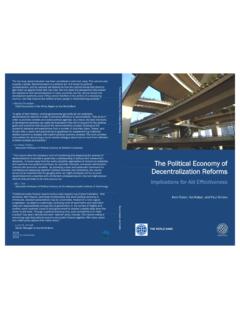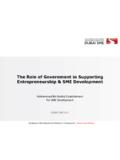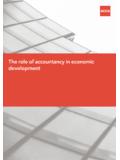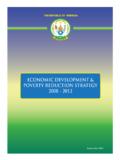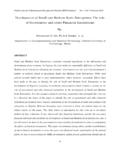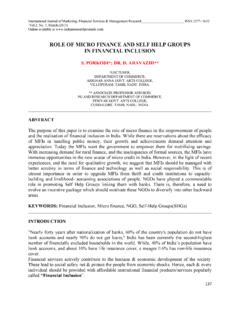Transcription of Finance and Economic Development: The Role of …
1 Finance and Economic development : The Role of Government Asl Demirg -Kunt *. December 2, 2008. Abstract: The empirical literature on Finance and development suggests that countries with better developed financial systems experience faster Economic growth and enjoy lower levels of poverty and income inequality. If Finance is important for development , why do some countries have growth-promoting financial systems while others do not? This paper argues that the governments play an important role in building effective and inclusive financial systems and discusses policies to make Finance work for development . JEL Classification Codes: O16, G2.
2 Keywords: Financial development , Economic development , financial sector policy * Senior Research Manager in Finance and Private Sector, development Research Department, World Bank. The author is grateful to Meghana Ayyagari, Thorsten Beck, Bob Cull, Patrick Honohan, Vojislav Maksimovic and Sole Martinez for helpful comments and Edward Al-Hussainy for excellent research assistance. This paper's findings, interpretations, and conclusions are entirely those of the author and do not necessarily represent the views of the World Bank, its Executive Directors, or the countries they represent. What is the role of the financial sector in Economic development ?
3 Economists hold very different views. On the one hand, prominent researchers believe that the operation of the financial sector merely responds to Economic development , adjusting to changing demands from the real sector and is therefore overemphasized (Robinson, 1952; Lucas, 1988). On the other hand, equally prominent researchers believe that financial systems play a crucial role in alleviating market frictions and hence influencing savings rates, investment decisions, technological innovation and therefore long-run growth rates. (Schumpeter, 1912;. Gurley and Shaw, 1955; Goldsmith, 1969; McKinnon, 1973; Miller 1998).1. As the financial crisis that started in the summer of 2007 continues to grow and spread all around the world, the potentially disastrous consequences of weak financial sector policies have moved to the forefront of policy debate once again.
4 At its best, Finance works quietly in the background, contributing to growth and poverty reduction; but when things go wrong, financial sector failures are painfully visible. Both success and failure have their origins largely in the policy environment; hence getting the important policy decisions right has always been and continue to be one of the central development challenges. Despite their inherent fragility, financial institutions underpin Economic prosperity. Financial markets and institutions arise to mitigate the effects of information and transaction costs that prevent direct pooling and investment of society's savings. While some theoretical models stress the importance of different institutional forms financial systems can take, more important are the underlying functions that they perform (Levine, 1997 and 2000; Merton and Bodie, 2004).
5 Financial systems help mobilize and pool savings, provide payments services that facilitate the exchange of goods and services, produce and process information about investors and investment projects to enable efficient allocation of funds, monitor investments and exert corporate governance after these funds are allocated, and help diversify, transform and manage risk. 1. Two famous quotes by Robinson and Schumpeter illustrate these different views. Joan Robinson (1952) argued Where enterprise leads Finance follows, whereas Joseph Schumpeter observed The banker, therefore, is not so much primarily a middleman He authorizes people in the name of society (to innovate).
6 2. While still far from being conclusive, the bulk of the empirical literature on Finance and development suggests that well-developed financial systems play an independent and causal role in promoting long run Economic growth. More recent evidence also points to the role of the sector in facilitating disproportionately rapid growth in the incomes of the poor, suggesting that financial development helps the poor catch up with the rest of the economy as it grows. These research findings have been instrumental in persuading developing countries to sharpen their policy focus on the financial sector. If Finance is important for development , why do some countries have growth-promoting financial systems while others do not?
7 What can governments do to develop their financial systems? This paper addresses these questions. The next section provides a brief review of the extensive empirical literature on Finance and Economic development and summarizes the main findings. Section III. discusses the governments' role in building effective and inclusive financial systems. Finally, the last section concludes with a discussion of the implications of the still-unfolding financial crisis on financial sector policies going forward. II. Finance and Economic development : Evidence By now there is an ever-expanding body of evidence that suggests countries with better developed financial systems experience faster Economic growth (Levine, 1997 and 2005).
8 More recent evidence also suggests financial development not only promotes growth, but also improves the distribution of income. The following sections provide a brief review of this literature and its findings, also discussing the main criticisms, namely issues of identification, problems associated with measurement and nonlinearities, as well as potential counterexamples and outliers. Finance and Growth It is by now well-established that significant part of the differences in long run Economic growth across countries can be explained by differences in their financial development (King and Levine, 1993;. Levine and Zervos, 1998). The finding that better developed banks and markets are associated with faster growth is also confirmed by panel and time-series estimation techniques (Levine, Loazya and Beck, 2000.)
9 3. Christopoulos and Tsionas, 2004; Rousseau and Sylla, 1999). This research also indicates that financial sector development helps Economic growth through more efficient resource allocation and productivity growth rather than through the scale of investment or savings mobilization (Beck, Levine and Loayza, 2000). Furthermore, cross-country time-series studies also show that financial liberalization boosts Economic growth by improving allocation of resources and the investment rate (Bekaert, Harvey and Lundblad, 2005). However, dealing with identification issues is always very difficult with aggregate data. Widespread problems include heterogeneity of effects across countries, measurement errors, omitting relevant explanatory variables, and endogeneity, all of which tend to bias the estimated effect of the included variables.
10 Although the studies cited above have made plausible efforts to deal with these concerns relying on instruments and making use of dynamic panel estimation methodologies, questions still remain. Hence researchers have used micro data and tried to exploit firm level and sectoral differences to go beyond aggregates. These studies address causality issues by trying to identify firms or sectors that are more likely to suffer from limited access to Finance and see how the growth of these firms and sectors is affected in countries with differing levels of financial development . Demirguc-Kunt and Maksimovic (1998) and Rajan and Zingales (1998) are two early examples of this approach.







